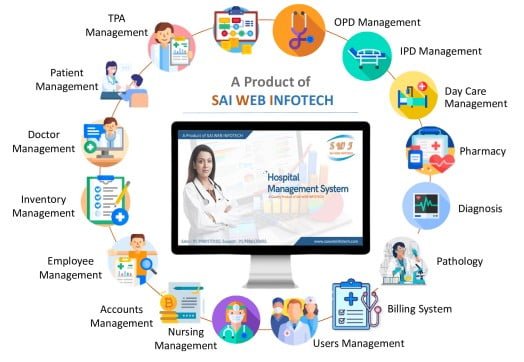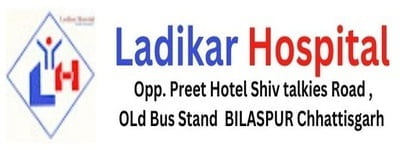Exploring the Benefits and Features of Hospital Software
Hospital Management System (HMS) is a software application designed to streamline the workflow of a hospital and enhance its overall efficiency. It provides a comprehensive solution for managing various aspects of hospital operations, including patient data management, appointment scheduling, inventory management, and financial management. From cloud-based solutions to telemedicine integration and HIPAA-compliant platforms, the options are vast. Let’s delve into the benefits and features of the best hospital software solutions available.
Benefits of Hospital Software
- Enhanced Patient Care: Hospital software empowers healthcare professionals to deliver personalized and timely care to patients. Through streamlined workflows, access to comprehensive patient data, and automated reminders, healthcare providers can ensure efficient care delivery and improved patient outcomes.
- Optimized Operations: One of the primary benefits of hospital software is its ability to optimize hospital operations. From appointment scheduling and patient registration to inventory management and billing, hospital software automates various processes, reducing administrative burdens and enhancing operational efficiency.
- Improved Communication: Hospital software facilitates seamless communication and collaboration among healthcare teams. Features such as secure messaging, task assignments, and real-time updates enable effective communication, leading to better coordination and decision-making.
- Data-driven Insights: Hospital software harnesses the power of data analytics to provide actionable insights. By analyzing patient trends, treatment outcomes, and operational metrics, healthcare providers can make informed decisions, identify areas for improvement, and drive quality initiatives.
- Cost Savings: Implementing hospital software can result in significant cost savings for healthcare organizations. Through automation, reduced paperwork, and optimized resource utilization, hospitals can lower administrative costs, minimize errors, and allocate resources more efficiently.
- Patient Engagement: Hospital software promotes active patient engagement and empowerment. Patient portals, appointment reminders, and educational resources enhance patient-provider communication, encourage adherence to treatment plans, and foster a positive patient experience.
- Regulatory Compliance: Hospital software ensures compliance with healthcare regulations and industry standards. With built-in features for HIPAA compliance, data security, and audit trails, healthcare organizations can mitigate risks and maintain regulatory adherence with ease.
Key Features of Hospital Software
- Electronic Health Records (EHR): Centralized electronic health records provide comprehensive patient information, including medical history, medications, lab results, and treatment plans. EHR features ensure data accuracy, accessibility, and interoperability across healthcare systems.
- Appointment Scheduling: Hospital software offers robust appointment scheduling capabilities, allowing patients to book appointments online, receive automated reminders, and manage their healthcare appointments conveniently. This feature optimizes clinic workflows and reduces no-show rates.
- Billing and Revenue Cycle Management: Hospital software streamlines billing processes, generates accurate invoices, and tracks payments and claims. Billing features include insurance verification, coding assistance, and reporting tools for financial analysis and revenue cycle management.
- Clinical Decision Support: Advanced clinical decision support tools embedded in hospital software assist healthcare providers in making evidence-based decisions. Decision support features include clinical guidelines, drug interaction checks, and alerts for critical conditions, enhancing patient safety and care quality.
- Telemedicine Integration: Hospital software integrates telemedicine capabilities, enabling virtual consultations, remote monitoring, and telehealth services. Telemedicine features facilitate access to care, improve patient engagement, and extend healthcare services beyond traditional clinic settings.
- Inventory and Supply Chain Management: Hospital software includes inventory management modules for tracking medical supplies, equipment, and pharmaceuticals. Inventory features optimize stock levels, automate replenishment processes, and ensure availability of essential resources for patient care.
- Reporting and Analytics: Hospital software offers comprehensive reporting and analytics tools for performance monitoring and data-driven decision-making. Reporting features include customizable dashboards, key performance indicators (KPIs), and trend analysis for operational insights and quality improvement.
- Mobile Accessibility: Many hospital software solutions are mobile-friendly, allowing healthcare providers to access patient records, communicate with colleagues, and manage tasks on-the-go. Mobile accessibility enhances productivity, flexibility, and responsiveness in healthcare delivery.
- Interoperability: Hospital software promotes interoperability by integrating with external systems, such as electronic medical records (EMR), laboratory information systems (LIS), and imaging platforms. Interoperability features facilitate seamless data exchange, continuity of care, and collaboration among healthcare stakeholders.
- Security and Compliance: Hospital software prioritizes data security and compliance with regulatory standards. Security features include encryption, access controls, audit trails, and data backup protocols to protect patient information, prevent unauthorized access, and ensure data integrity.
Hospital Software
Rural hospitals often face budget constraints. However, affordable hospital software tailored for rural settings can automate workflows, enhance patient care, and improve overall operational efficiency without breaking the bank.
The future of healthcare lies in telemedicine, and hospital software with integrated telemedicine capabilities allows medical professionals to conduct virtual consultations, monitor patients remotely, and deliver quality care beyond traditional boundaries.
Protecting patient data is paramount. HIPAA-compliant hospital software ensures that patient information remains secure, encrypted, and compliant with regulatory standards, providing peace of mind for healthcare providers and patients alike.
Every healthcare facility has unique needs. Customizable hospital software empowers clinics to tailor workflows, reporting tools, and patient engagement features to suit their specific requirements, enhancing overall efficiency and productivity.
Efficient scheduling is crucial in a hospital setting. Hospital scheduling software simplifies shift planning, manages medical staff availability, and optimizes resources, ensuring smooth operations and improved patient care.
In today’s mobile-centric world, having access to hospital software on-the-go is essential. Mobile-friendly hospital software allows medical professionals to access patient records, update charts, and communicate with colleagues from anywhere, enhancing collaboration and efficiency.
Streamlining patient billing processes is key to financial stability. The best hospital software for patient billing automates billing tasks, generates accurate invoices, and integrates with insurance systems for seamless claims processing.
Electronic Medical Records (EMR) are the backbone of modern healthcare. Integrating hospital software with EMR systems centralizes patient information, improves data accuracy, and facilitates comprehensive care coordination among healthcare providers.
Efficient inventory management is crucial for hospitals and clinics. Hospital software for inventory management automates inventory tracking, monitors stock levels in real-time, and streamlines supply chain processes, reducing waste and ensuring adequate supplies for patient care.
Nurses play a vital role in patient care. User-friendly hospital software designed for nurses simplifies documentation, medication management, and communication, allowing nurses to focus more on patient interaction and less on administrative tasks.
Engaged patients are more likely to follow treatment plans and achieve better health outcomes. Hospital software for patient engagement includes features such as patient portals, appointment reminders, educational resources, and feedback mechanisms, fostering a collaborative relationship between patients and healthcare providers.
Open-source hospital software offers flexibility and customization options. Hospitals and clinics can modify the software to suit their needs, collaborate with a community of developers, and benefit from continuous updates and improvements.
Efficient appointment scheduling is essential for reducing wait times and optimizing patient flow. Hospital software for appointment scheduling automates appointment bookings, sends reminders to patients, and minimizes scheduling conflicts, enhancing overall clinic efficiency.
Streamlining workflows improves operational efficiency. Hospital workflow management software optimizes task assignments, tracks progress, and identifies bottlenecks, allowing healthcare providers to deliver timely and coordinated care.
Electronic Health Records (EHR) centralize patient health information. Hospital software for EHRs ensures data accuracy, facilitates information exchange among healthcare providers, and supports evidence-based decision-making for better patient outcomes.
Pediatric hospitals require specialized software to cater to the unique needs of young patients. Pediatric hospital software includes features such as growth tracking, immunization schedules, developmental assessments, and child-friendly interfaces, ensuring comprehensive care for pediatric populations.
Data-driven insights drive informed decision-making. Hospital software for data analytics and reporting aggregates data from various sources, generates meaningful reports, identifies trends, and supports quality improvement initiatives within healthcare organizations.
Medical imaging plays a crucial role in diagnosis and treatment planning. Hospital software for medical imaging analysis enhances image interpretation, streamlines workflow for radiologists, and integrates imaging data with patient records for comprehensive care management.
Adopting new hospital software requires proper training. Training modules integrated into hospital software platforms provide on-demand learning resources, tutorials, and certifications to ensure that medical staff are proficient in using the software effectively.
Maintaining high standards of care and compliance with regulations is paramount. Hospital software for quality assurance and compliance automates audits, tracks compliance metrics, and facilitates continuous quality improvement initiatives, ensuring adherence to best practices and regulatory standards.
Telehealth services are becoming increasingly popular. Advanced hospital software for telehealth services includes virtual visit capabilities, remote monitoring tools, secure messaging, and teleconsultation features, expanding access to care and improving patient outcomes.
Automating inventory processes saves time and reduces errors. Hospital software for inventory automation utilizes barcode scanning, RFID technology, and automated alerts to manage stock levels, track expiration dates, and streamline inventory replenishment tasks.
Protecting patient data from cybersecurity threats is a top priority. Hospital software for patient data security employs encryption, access controls, audit trails, and regular security assessments to safeguard sensitive information and prevent data breaches.
Surgical facilities require specialized software to manage complex procedures. The best hospital software for surgical facilities includes surgical scheduling, preoperative assessments, intraoperative documentation, postoperative care plans, and outcomes analysis tools, ensuring efficient surgical workflows and optimal patient outcomes.
Telemedicine consultations bridge geographical barriers and improve access to care. Hospital software for telemedicine consultations integrates video conferencing, virtual clinic capabilities, secure messaging, and electronic prescribing, enabling healthcare providers to deliver remote consultations and follow-ups effectively.
Interoperability is essential for seamless information exchange. Hospital software with interoperability features integrates with external systems, shares data securely across platforms, and supports standardized data formats, facilitating smooth communication and collaboration among healthcare stakeholders.
Some Of Our Happy Clients Globally!
Our Clients in India with below cities:
India : Bangalore – Rajkot – Delhi – Mumbai – Lucknow – Visakhapatnam – Hyderabad – Uttar Pradesh – Chennai – Coimbatore – Kolkata – Ahmedabad – Pune – Cochin – Chandigarh – Noida – Indore – Bhopal – Surat – Meerut – Warangal – Suryapet – Nasik – Nanded – Chhattisgarh – Ranchi – Patna – Raipur – Srinagar – Bhubaneswar – Shimla – Dehradun – Thiruvananthapuram – New Delhi – Gandhinagar – Gangtok – Agartala – Dispur – Imphal – Shillong – Kohima – Aizawl – Itanagar – Jaipur – Panaji – Port Blair – Kavaratti – Leh – Daman – Puducherry – Amaravati – Guwahati – Krishnanagar – Secunderabad – Atal Nagar-Nava Raipur – Amravati – Silvassa – Gairsain – Hubali-Dharwad – Jammu – Bhilai – Darjeeling – Bhagalpur – Anand etc…
Our Presence : India - Zambia - Lagos - Nigeria - United Arab Emirates - East Africa - Sri Lanka - United States - United Kingdom - Australia - Kuwait - Bangladesh - UAE - South Africa - Zimbabwe - Kenya - Tanzania - Qatar - China - Russia - Bangladesh - Somalia - Saudi Arabia - Maldives - South Africa.
Call us for an appointment
+91, 9986 170 602
Feel free to contact us.
support@saiwebinfotech.com
Reach to us via our location
View Map




















